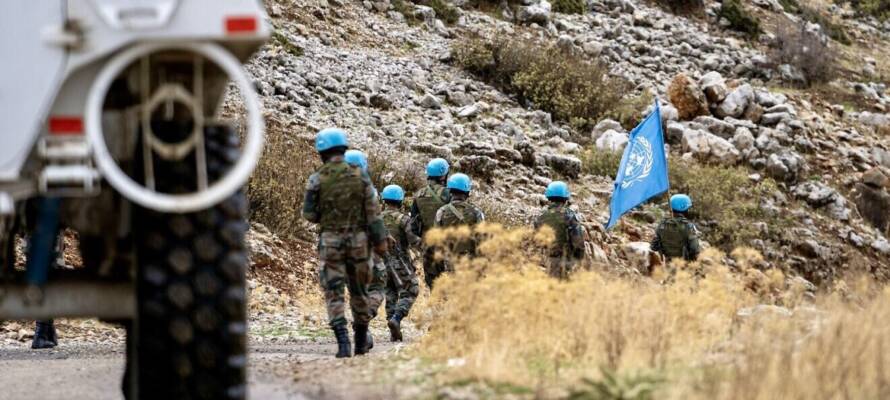Hezbollah has compounds located just meters from UNIFIL posts, which the UN refuses to move despite Israel’s requests.
By Joshua Marks, JNS
Over the past month, the Lebanese terror group Hezbollah has fired 25 rockets and missiles at Israeli communities and Israeli forces from terrorist compounds embedded near United Nations Interim Force in Lebanon (UNIFIL) posts in Southern Lebanon, the Israeli military said on Sunday night.
One of the attacks resulted in the deaths of two IDF soldiers.
The IDF accused the Iranian-backed terror army of “exploiting their proximity to U.N. forces.”
Near a school and a UN building—these are locations where Hezbollah chose to launch rockets.
On Oct. 6, three rockets were launched 25 meters from a school and 200 meters from a UN building, resulting in the death of two IDF soldiers.
The IDF must operate in southern Lebanon… pic.twitter.com/63C5xPQUWV
— Israel Defense Forces (@IDF) October 13, 2024
During a targeted ground raid in Southern Lebanon, troops from the 146th Division located hundreds of weapons, including firearms, grenades and rocket launchers aimed at Israeli territory. These weapons were stored in compounds located from a few dozen meters up to a few hundred meters from UNIFIL posts situated near the Blue Line.
“UNIFIL in southern Lebanon was deployed to implement U.N. Security Council Resolution 1701 and prevent the presence of armed Hezbollah operatives south of the Litani River. However, both the State of Lebanon and the international community have failed to implement Resolution 1701, despite repeated requests to do so,” the IDF said.
“For years, Hezbollah has embedded itself in southern Lebanon in grave violation of U.N. Security Council resolutions. The organization has stockpiled large quantities of weapons aimed at Israeli civilians over the years and has deliberately built up its attack infrastructure near UNIFIL posts,” the military continued.
Unbelievable: an underground Hezbollah position only 100 meters from the UNIFIL base pic.twitter.com/JgV4B5Vjhv
— איתי בלומנטל 🇮🇱 Itay Blumental (@ItayBlumental) October 13, 2024
The IDF emphasized that its raids target only Hezbollah and not UNIFIL posts, forces or infrastructure, noting that on Sept. 30, before the start of ground operations in Lebanon, IDF representatives had requested that UNIFIL move its personnel away from posts located within five kilometers of the Blue Line because this area would become an active combat zone.
However, the United Nations has refused to move its forces to safer areas, despite a plea from Israeli Prime Minister Benjamin Netanyahu on Sunday.
“I want to directly address the U.N. Secretary-General from here: It is time for you to remove UNIFIL from Hezbollah’s strongholds and from the combat areas,” the premier said in a statement.
“The IDF has repeatedly requested this, only to be met with refusal, a refusal aimed solely at providing Hezbollah terrorists with a human shield. Your refusal to evacuate UNIFIL soldiers turns them into hostages of Hezbollah. This endangers both them and the lives of our soldiers,” he continued.
“We regret the harm caused to UNIFIL soldiers, and we are doing everything we can to prevent it. But the simplest and most obvious way to ensure their safety is to simply remove them from the danger zone. Mr. Secretary-General, get the UNIFIL forces out of harm’s way. It should be done right now, immediately,” Netanyahu said.
“Unfortunately, some European leaders are applying pressure in the wrong place. Instead of criticizing Israel, they should direct their criticism at Hezbollah, which uses UNIFIL as a human shield, just as Hamas in Gaza uses UNRWA as a human shield. Unfortunately, in Gaza, UNRWA even collaborates with Hamas,” he added.
United Nations Secretary-General Antonio Guterres was defiant on Sunday, saying that any attacks on peacekeepers “may constitute a war crime.”
“UNIFIL peacekeepers remain in all positions and the UN flag continues to fly,” U.N. spokesperson Stephane Dujarric said in a statement.
For its part, the Israeli army said that “the IDF maintains continuous communication with UNIFIL to avoid, as much as possible, any harm to UNIFIL personnel in the area and will continue to do so, despite the complexities of the UNIFIL’s presence inside the combat zone.”
